Mixed Feelings in Midland Market Towns
Page 55
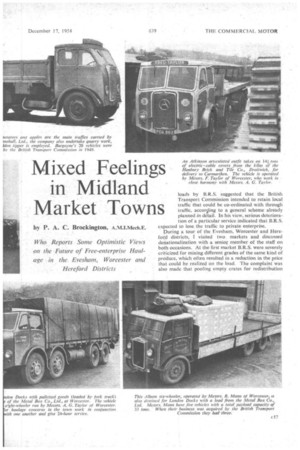
Page 54
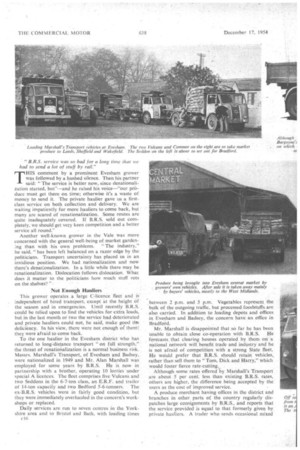
Page 56
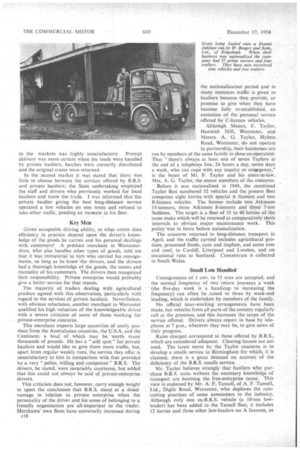
Page 57
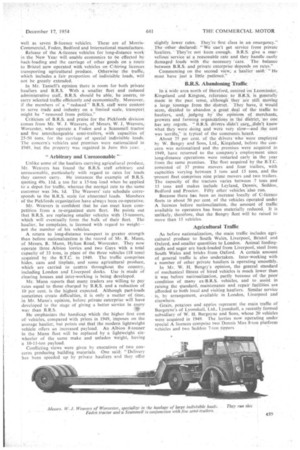
Page 58
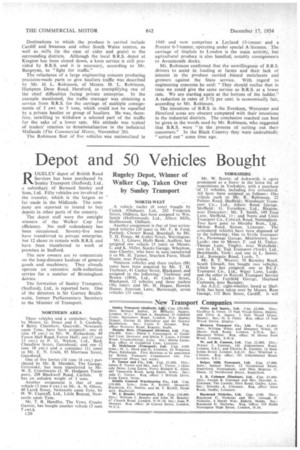
If you've noticed an error in this article please click here to report it so we can fix it.
by P. A. C. Brockington, A.m.Lmech.E.• "B.R.S. service was so bad for a long time that we had to send a lot of stuff by rail." THIS comment• by a prominent Evesham grower was followed by a hushed silence. Then his partner said: "The service is better now, since denationalization started, but"—and he raised his voice—"our produce must get there on time; otherwise it's a waste of money to send it. The private haulier gave us a firstclass service on both collection and delivery. We are waiting impatiently for more hauliers to come back, but many are scared of renationalization. Some routes are quite inadequately covered. If B.R.S. sold out completely, we should get very keen competition and a better service all round."
Another well-known grower in the Vale was more concerned with the general well-being of.market gardening than with his own problems. "The industry," he said, "has been left balanced on a razor edge by the politicians. Transport uncertainty has placed us in an invidious position. We had nationalization and now there's denationalization. In a little while there may be renationalization. Dislocation follows dislocation. What does it matter to the politicians how much stuff rots on the shelves?' .
Not Enough Hauliers This grower operates a large C-licence fleet and is independent of hired transport, except at the height of the season and in emergencies. Until recently B.R.S. could be relied upon to find the vehicles for extra loads, but in the last month or two the service had deteriorated and private hauliers could not, he said, make good the deficiency. In his view, there were not enough of them; they were afraid to come back.
To the one haulier in the Evesharn district who has returned to long-distance transport "on fUll strength," the threat of renationalization is a normal business risk. Messrs. Marshall's Transport, of Evesham and Badsey, were nationalized in 1949 and Mr. Alan Marshall was employed for some years by B.R.S. He is now in partnership with a brother, operating 10 lorries under special A licences. The fleet comprises five Vulcans and two Seddons in the 6-7-ton class, an E.R.F. and trailer of 14-ton capacity and two Bedford 5-6-tonners. The ex-B.R.S. vehicles were in fairly good condition, but they were immediately overhauled in the concern's workshops or replaced.
Daily services are run to seven centres in the Yorkshire area and to Bristol and Bath, with loading times c16
between 2 p.m. and 5 p.m. Vegetables represent the bulk of the outgoing traffic, but processed foodstuffs are also carried. In addition to loading depots and offices in Evesham and Badsey, the concern have an office in Bradford.
Mr. Marshall is disappointed that so far he has been unable to obtain close co-operation with B.R.S. He forecasts that clearing houses operated by them on a national network willbenefit trade and industry and he is not afraid of competition with a strong State fleet. He would prefer that B.R.S. should retain vehicles, rather than sett them to "Tom, Dick and Harry," which would foster fierce rate-cutting.
Although some rates offered by Marshall's Transport are about 5 per cent. less than existing B.R.S. rates, others are higher, the difference being accepted by the users as the cost of improved service.
A produce merchant having offices in the district and branches in other, parts of the country regularly dispatches large consignments by B.R.S., and reports that the service provided is equal to that formerly given by private hauliers. A trader who sends occasional mixed loads by B.R.S. suggested that the British Transport Commission intended to retain local traffic that could be co-ordinated with through traffic, accorging to a general scheme already planned in detail. In his view, serious deterioration of a particular service indicated that B.R.S. expected to lose the traffic to private enterprise.
During a tour of the Evesham, Worcester and Hereford districts, I visited two markets and discussed denationalization with a senior member of the staff on both occasions. At the first market B.R.S. were severely criticized for mixing different grades of the same kind of produce, which often resulted in a reduction in the price that could be realized on the load. The complaint was also made that pooling empty crates for redistribution to the markets was highly unsatisfactory. Prompt delivery was more certain when the loads were handled by private hauliers, batches were correctly distributed and the original crates were returned.
In the second market it was stated that there was little to choose between the services offered by B.R.S. and private hauliers; the State undertaking employed the staff and drivers who -previously worked for local hauliers and knew the trade. I was informed that the private haulier giving the best long-distance service operated a few vehicles on one route and refused to take other traffic, pending an incase in his fleet.
Key Men Given acceptable driving ability, to what extent does efficiency in practice depend upon the driver's knowledge of the goods he carries and his personal dealings with customers? A prOduce merchant in Worcestershire, who also handles other types of goods. told me that it was immaterial to him who carried his consignments, so long as he knew'the drivers, and the drivers had a thorough knowledge of the goods, the routes and mentality of his customers. The drivers then recognized their responsibility. Private enterprise would probably give a better service for that reason.
The majority of traders dealing with agricultural produce agreed with this observation, particularly with regard to the services of private hauliers. Nevertheless, with obvious reluctance, another merchant in Worcester qualified his high valuation of the knowledgeable driver with a severe criticism of some of those working for private-enterprise concerns.
This merchant imports large quantities of costly produce from the Australasian countries, the U.S.A. and the Continent, a load of which may be worth many thousands of pounds. He has a "soft spot" for private hauliers and would like to give them more traffic, but, apart from regular weekly runs, the service they offer is unsatisfactory to him in comparison with that provided by a very "polite, willing and competent" B.R.S. The drivers, he stated, were invariably courteous, but added that this could not always be said of private-enterprise. drivers.
This criticism does not, however, carry enough weight to upset the conclusion that B.R.S. stand at a disadvantage in 'relation to private enterprise when the personality of the driver and his sense of belonging to a friendly organization are all-important to the trader. Merchants' own fleets have universally increased during c18
the nationalization period and in many instances traffic is given to hauliers because they provide, or promise to giVe when they have become fully re-established, an extension of the personal service offered by C-licence vehicles.
Although Messrs. F. Taylor, Henwick Mill, Worcester, and Messrs. A. G. Taylor, Hylton Road, Worcester, do not operate in partnership, their businesses are run by members of the same family in close co-operation. That " there's always at least one of seven Taylors at the end of a telephone line, 24 hours a day, seven days a week, who can cope with any inquiry or emergency," is the boast of Mr. F. Taylor and his sister-in-law, Mrs. A. G. Taylor, the senior members of the concerns.
Before it was nationalized in 1949, the combined Taylor fleet numbered 32 vehicles and the present fleet comprises eight lorries with special A licences and two B-licence vehicles. The former include two Atkinson 15-tormers, three Atkinson 8-tormers and three 7-ton Seddons. The target is a fleet of 35 to 40 lorries of the same make which will be renewed at comparatively short intervals to obviate major maintenance work. This policy was in force before nationalization.
The concerns returned to long-distance transport in April, and the traffic carried includes agricultural produce, processed foods, cans and tinplate, and some iron and steel, to Cardiff, Liverpool and London, and on occasional runs to Scotland. Concentrate is collected in South Wales.
Small Lots Handled Consignments of 1 cwt. to 15 tons are accepted, and the normal frequency of two return journeys a week (the five-day week is a handicap to increasing the frequency) can often be raised to three by week-end loading, which is undertaken by members of the family.
No official inter-working arrangements have been made, but vehicles from all parts of the country regularly call at the premises, and this increases the scope of the service offered. Drivers always report to base by telephone at 7 p.m., wherever they may be, to give news of their progress.
Rates charged correspond to those offered by B.R.S.,
which are considered adequate. Clearing houses arc not used. The latest move by the Taylor concerns is to develop a smalls service to Birmingham for which, it is claimed, there is a great demand on account of the deficiency of the B.R.S. smalls service.
Mr. Taylor believes strongly that hauliers who purchase B.R.S. units without the necessary knowledge of transport are harming the free-enterprise cause. This view is endorsed by Mr. A. F. Tansell, of A. F. Tansell, Ltd., DigIis Road, Worcester, who deplores the ratecutting practices of some newcomers to the industry. Although only one ex-B.R.S. vehicle (a 10-ton lowloader) has been added to the Tansell fleet, it includes 12 lorries and three other low-loaders on A licences, as
well as seven B-licence vehicles. These are of MorrisCommercial, Foden, Bedford and International manufacture.
Release of the A-licence vehicles for long-distance work in the New Year will enable economies to be effected by back-loading and the carriage of other goods on a route to Bristol now operated with vehicles on C.-hiring licences transporting agricultural produce. Otherwise the traffic, which includes a fair proportion of indivisible loads, will not be greatly extended.
In Mr. Tanscll's opinion there is room for both private hauliers and B.R.S. With a smaller fleet and reduced administrative staff, B.R.S. should be able, he asserts, to. carry selected traffic efficiently and economically. Moreover, if the members of a "reduced" B.R.S. staff were Content' to serve trade and industry on a limited scale, transport might be "removed from politics."
Criticism of B.R.S. and praise for the Pickfords division comes from Mr. W. J. Weavers, of Messrs. W. J. Weavers; Worcester, who operate a Foden and a Scammell tractor and five interchangeable semi-trailers, with capacities of 25-50 tons, for the carriage of special indivisible loads. The concern's vehicles and premises were nationalized in 1949, but the property was regained in June this year.
" Arbitrary and Unreasonable "
Unlike some of the hauliers carrying agricultural produce, Mr. Weavers has found the B.R.S. staff arbitrary and unreasonable, particularly with regard to rates for loads they cannot carry. He instances the example of B.R.S. quoting 49s. 11d, a ton for a I5-ton load when he applied to a depot for traffic, whereas the norrrial rate to the. same customer was 34s. Id. The Weavers' rate schedule corresponds to the B.R.S. scale for abnormal loads. Members of the Pickfords organization have always been co-operative.
Mr. Weavers is confident that he can meet keen competition from a re-organized state fleet. fie points out that B.R.S. are replacing smaller vehicles with 15-tonners, which will eventually form the bulk of their fleet. The haulier, he complains, is licensed with regard to weight— not the number of his vehicles.
A return to long-distance transport in greater strength than before nationalization is the record of Mr. R. Mann, of Messrs. R. Mann, Hylton Road, Worcester. They now operate three Albion lorries and two Guys with a total capacity of 33 tons, in place of the three vehicles (18 tons) acquired by the B.T.C. in 1949. The traffic comprises hides, cans and tinplate, and some agricultural produce, which are carried to centres throughout the country, including London and Liverpool docks. Use is made of clearing houses and inter-working is being developed.
Mr. Mann reports that many traders are willing to pay rates equal to those charged by B.R.S. and a reduction of 10 per cent, is the highest expected. Although part-loads sometimes create difficulties, it is only a matter of time, in Mr. Mann's opinion, before private enterprise will have developed to the stage of giving a better service in every way than B.R.S.
He emphasizes the handicap which the higher first cost of vehicles, compared with prices in 1949, imposes on the average haulier, but points out that the modern lightweight vehicle offers an increased payload. An Albion 8-tonner in the Mann fleet will be replaced by a lightweight sixwheeler of the same make and unladen weight, having a 10-11-ton payload.
Conflicting views were given by executives of two concerns producing building materials. One said: "Delivery has been speeded up by private hauliers and they offer slightly lower rates. They're first class in an emergency." The other declared: "We Can't get service from private hauliers. They're nOt keen enough. B.R.S. give a marvellous service at a reasonable rate and they handle easily damaged F loads with the necessary 'care. The balance between B.R.S. and private chterprise depends on rates."
Commenting on the second view, a haulier said: " Ha must have just a little patience."
B.R.S. Abandoning Traffic In a wide area north of Hereford, centred on Leominster, Kingsland and Kington, reference. to B.R.S. is generally Made in the past tense, although they are still moving a large tonnage from the district. They have, it would seem, decided to abandon. a great .deal of the traffic to hauliers, and: judging by the opinions of merchants, growers and farming organizations in :the district, no one has any regrets. " B.R.S. drivers 'didn't carg„didn't know what they were doing and were very slow—and the cost was terrific," is typical of the comments.heard.
About 75 per cent. of the drivers who were employed by W. Bengry and Sons, Ltd., Kingsland, before the concern was nationalized and the premises were acquired in 1949, have returned to the company's employment since long-distance operations were restarted early in the year from the same premises. The fleet acquired by the B.T.C. Consisted of 37 prime movers and four trailers, with capacities varying between 5 tons and 15 tons, and the present fleet comprises nine prime movers and two trailers. The capacity of the tractors varies between 7 tons and 15 tons and makes include Leyland, Dennis, Seddon, Bedford and Proctor. Fifty other vehicles also run.
Because there his been an increase locally of C-licence fleets to about 50 per cent. of the vehicles operated under. A licences before nationalization, the amount of traffic available to operators has been materially reduced. It is unlikely, therefore, that the Bengry fleet will be raised to more than 15 vehicles.
Agricultural Traffic
As before nationalization, the main traffic includes agricultural produce to South Wales, Liverpool, Bristol and Oxford, and smaller quantities to London. Animal feedingstuffs and sugar are back-loaded from Liverpool, steel from South Wales and bricks from Oxford. A certain amount of general traffic is also undertaken. Inter-working with a number of other private hauliers is operating smoothly.
In Mr. W. H. Bengry's opinion, the general standard of mechanical fitness of hired vehicles is much lower than it was before nationalization, partly because of the poor condition of many ex-B.R.S. vehicles, and to assist in raising the ktandard, maintenance and repair facilities are afforded to both local and visiting hauliers. Similar service is, by arrangement, available in London, Liverpool and elsewhere.
Grain, potatoes and apples represent the main traffic of Burgoyne's of Lyonshall, Ltd., Lyonshall, a recently formed subsidiary of W. H. Burgoyne and Sons, whose 20 vehicles were acquired in 1949. The lorries now operating under special A licences comprise two Dennis Max 8-ton platform vehicles and two Seddon 7-ton tippers
Destinations to which the produce is carried include Cardiff and Swansea and other South Wales centres, as well as mills (in the case of cider and grain) in the surrounding districts. Although the local B.R.S. depot at Kington has been closed down, a keen service is still provided by B.R.S. and it is necessary, according to Mr. Burgoyne, to "fight for traffic."
The reluctance of a large engineering concern producing precision-made parts to give hauliers traffic was described by Mr. H. L. Robinson, of Messrs. H. L. Robinson, Harhpton Dene Road, Hereford, as exemplifying one of the chief difficulties facing private enterprise. In the example mentioned, the traffic manager was obtaining a service from B.R.S. for the carriage of multiple consignments of 5 cwt. to 5 tons, which could not be equalled by a private haulier or group of hauliers. He was, therefore, unwilling to withdraw a selected part of the traffic for the sake of a lower rate. His attitude was typical of traders' reaction to denationalization in the industrial Midlands (The Commercial Motor, Novembe( 26).
The Robinson fleet of live vehicles was nationalized in
1944 and now comprises a Leyland 15-termer and a Proctor 6-7-tonner, operating under special A licences. The carriage of tinplate to London is the main activity, but agricultural produce is also handled, notably consignments to Avonmouth docks.
Mr. Robinson confirmed that the unwillingness of B.R.S. drivers to assist in loading at farms and their lack of interest in the produce carried biased merchants and growers against the State service. With regard to engineering concerns he said: "They should realize that in time we could give the same service as B.R.S. at a lower rate, We are starting again at the bottom of the ladder." A reduction in rates of 5-7iper cent. is economically fair, according to Mr. Robinson.
The intentions of B.R.S. in the Evesham, Worcester and Hereford areas are obscure compared with their intentions in the industrial districts. The conclusion reached can best be given in the words used by Mr. Robinson, who suggested that B.R.S. were "in the process of sorting out their customers." In the Black Country they were undoubtedly " sorted out" some time ago.












































































































